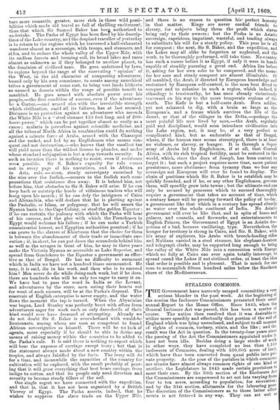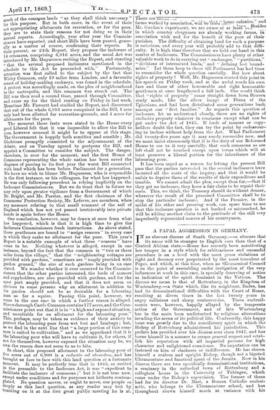STEALING COMMONS.
THE Government have narrowly escaped committing a very serious blunder in the past week. At the beginning of the session the Inclosure Commissioners presented their usual annual Report to the Home Office. Since 1845, when the General Inclosure Act was passed, this has been a matter of course. The nation then resolved that it was desirable to utilize more speedily and effectually that portion of the soil of England which was lying unenclosed, and subject to all manner of rights of common, turbary, stints, and the like ; and the result was the Act in question. In the twenty-four years since the passing of the Act the Commissioners appointed under it have not been idle. Besides doing a large stroke of work in other ways, they have completed no less than 1,169 inclosures of Commons, dealing with 530,605 acres of land, which have thus been converted from quasi public into linvate property. As the poor of the parishes in which commons are situate have almost always common rights of one kind or another, the Legislature in 1845 made certain provisions to meet their case. By the 30th section of the Enclosure Act the Commissioners are empowered to set out lots varying fro m four to ten acres, according to population, for recreation; and by the 31st section, allotments for the labouring poor. The discretion of the Commissioners as to these latter allotments is not fettered in any way. They can set out E-3 much of the common lands " as they shall think necessary " for this purpose. But in both cases, in the event of their not appropriating allotments for recreation, or for the poor, they are to state their reasons for not doing so in their annual reports. Accordingly, year after year the Commissioners have reported, and short Bills have been passed, generally as a matter of course, confirming their reports. In their present, or' 24th Report, they propose the inclosure of 14 commons, comprising 6,916 acres, and the usual Act was introduced by Mr. Huguessen reciting the Report, and enacting "that the several proposed inclosures mentioned in the
schedule to this Act be proceeded with." Fortunately, attention was first called to the subject by the fact that Wisley Common, only 19 miles from London, and a favourite resort of holiday-making cockneys, was found in the schedule. A protest was accordingly made, on the plea of neighbourhood to the metropolis, and this common was struck out. The Bill was then read a second time, passed through Committee, and came up for the third reading on Friday in last week. Meantime Mr. Fawcett had studied the Report, and discovered that out of the whole 6,916 acres comprised in the Bill, 1 acre only had been allotted for recreation-grounds, and 4 acres for allotments for the poor.
The moment these facts were stated to the House every good Liberal felt that it was impossible to allow the Bill to pass, however unusual it might be to oppose at this stage. The Government is happily both sensitive and sensible ; Mr. Gladstone promptly consented to the adjournment of the debate, and on Tuesday agreed to postpone the Bill, and appoint a Committee to consider the subject. The danger, therefore, is over for the moment, and the first House of Commons representing the whole nation has been saved the disgrace of passing in its first year the worst Bill connected with land which has been before Parliament for a generation. We have no wish to blame Mr. Huguessen, who is responsible in the first instance, or his colleagues, for what has happened. He was only following precedent in relying implicitly on the Inclosure Commissioners. But we do trust that in future we may rely upon greater vigilance from a Government of which Mr. Bright, and Mr. Forster, and the first chairman of the Commons' Protection Society, Mr. Lefevre, are members, when any measure relating to that small remnant of the soil of England which has not yet passed irretrievably into private hands is again before the House.
One conclusion, however, may be drawn at once from what has happened, which is that it is high time to give the Inclosnre Commissioners fresh instructions. As above stated, those gentlemen are bound to " assign reasons " in every case in which they make no allotment for the poor. This year's Report is a notable example of what these "reasons" have come to be. Nothing whatever is alleged, except in one instance, beyond the fact that the common is " two or three miles from the village," that the " neighbouring cottages are provided with gardens," sometimes are "amply provided with garden ground," the size of such gardens being in no case stated. We wonder whether it ever occurred to the Commissioners that the other parties interested, the lords of manors and copyholders, are also provided with gardens, and for the most part amply provided, and that it does not seem so obvious to some persons why an allotment in addition to his garden should not be as desirable for a labouring man as for a squire. Passing this point, however, we come to the one case in which a further reason is alleged. Shrewsborough Castle Common contains 177 acres, and the Commissioners point out that it is in " a high and exposed situation, and unsuitable for an allotment for the labouring poor." This, perhaps, may be taken as evidence of their anxiety to protect the labouring poor from wet feet and lumbago ; but, as we find in the next line that " a large portion of this common is suited to cultivation," and as we apprehend that it is the labouring poor who will have to cultivate it, for others, if not for themselves, however exposed the situation may be, we own the reason does not seem to us to bite.
In short, this proposed allotment to the labouring poor of five acres out of 6,900 is a reductio ad absurdum, and has brought us face to face with this land question at a fortunate moment. It may be perfectly true that in 1845, as recited in the preamble to the Inclosure Act, it was " expedient to facilitate the inclosure of commons ;" but it is not true now, except under conditions and for purposes not hitherto contemplated. No question moves, or ought to move, our people so deeply as this land question, as any reader may test by touching on it at the first great public meeting he is at. farms worked by association"wili lie tista",14..9mc colonies," and Mr. Gurdon's experiment, we are aware of at lea8'100, Besides in which country clergymen are already working farms, in association with and for the benefit of the poor of their parishes. The difficulty of obtaining land for such a purpose is notorious, and every year will probably add to that difficulty. It is high time therefore that we held our hand in this matter of Inclosures. The Commissioners have plenty of other valuable work to do in carrying out " exchanges," " partitions," " divisions of intermixed lands," and defining lost boundaries." Let them keep to these till Parliament has had time to reconsider the whole question carefully. But bow about rights of property ? Well, Mr. Huguessen started this point in his speech on Friday week, and at the awful words his own face and those of other honourable and right honourable gentlemen at once lengthened a full inch. One would think that "rights of property " came straight down from Heaven ready made, like the silver image of Diana of the Ephesians, and had been distributed some generations back amongst our first families." As regards this question of inclosure, let us understand clearly, there are no rights of exclusive property whatever in commons except what can begot under the Act of 1845. If lords of manors or copyholders doubt the fact, they can try the point by endeavouring to inclose without help from the Act. What Parliament did twenty-five years ago it may surely reconsider now, and we must insist strenuously that it is the duty of our Reformed House to see to it very carefully, that such commons as are left shall not be touched except upon terms which will at least preserve a liberal portion for the inheritance of the labouring poor. It has been urged as a reason for letting the present Bill pass that the parties interested in the several inclosures have incurred all the costs of the inquiry, and that it would be unfair to deprive them of the results of their expenditure and trouble. We cannot admit the plea, except thus far,—that if they get no inclosure, they have a fair claim to be repaid their costs. This, we think, the Treasury should do without demur,. wherever the result of the promised Committee shall be tostop the particular inclosure. And if the Premier, in the midst of his other and pressing work, can spare time to see that this inclosure question is not barked or mistouched, he will be adding another claim to the gratitude of the still very imperfectly represented masses of his countrymen,



































 Previous page
Previous page